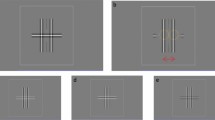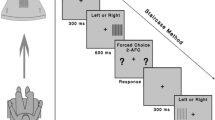Abstract
MOST published researches on visual acuity have assumed an unrestricted time of observation, but recent studies of the relations between intensity discrimination and acuity, and photo-chemical theories thereof, have indicated that the wandering of fixation plays an important part in the performance of the visual system. It appears that a study of visual acuity in relation to exposure time may throw additional light on the subject.
This is a preview of subscription content, access via your institution
Access options
Subscribe to this journal
Receive 51 print issues and online access
$199.00 per year
only $3.90 per issue
Buy this article
- Purchase on Springer Link
- Instant access to full article PDF
Prices may be subject to local taxes which are calculated during checkout
Similar content being viewed by others
References
Niven and Brown, J. Opt. Soc. Amer., 34, 738 (1944).
Hecht, J. Gen. Physiol., 18, 767 (1935).
Graham and Kemp, J. Gen. Physiol., 21, 635 (1938).
Author information
Authors and Affiliations
Rights and permissions
About this article
Cite this article
MARTIN, L., KANIOWSKI, W. Flash Visual Acuity. Nature 159, 25–26 (1947). https://doi.org/10.1038/159025b0
Issue Date:
DOI: https://doi.org/10.1038/159025b0
Comments
By submitting a comment you agree to abide by our Terms and Community Guidelines. If you find something abusive or that does not comply with our terms or guidelines please flag it as inappropriate.



